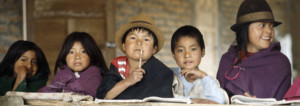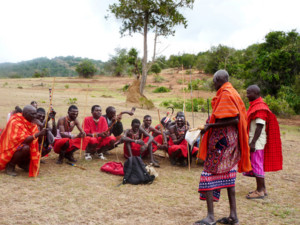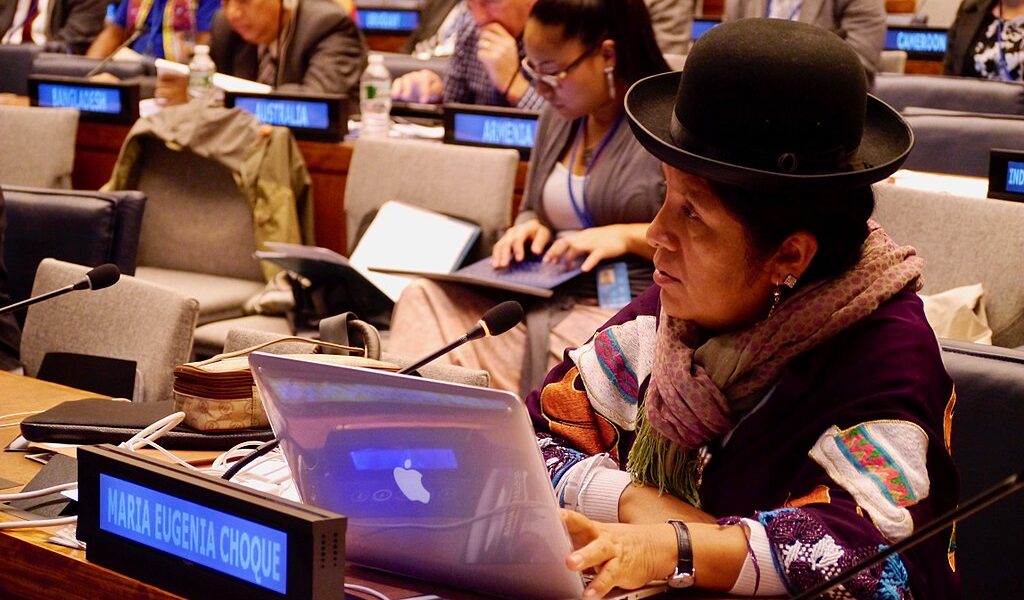UN Forum on indigenous issues opens 2016 session with focus on conflict, peace and resolution
9 May 2016 – United Nations Secretary-General Ban Ki-moon today announced the launch of a plan to realize the full rights of indigenous peoples who are increasingly being drawn into conflicts over their lands and resources.
“I am pleased to send greetings to the Permanent Forum on Indigenous Issues,” Mr. Ban said via video message at the opening of the forum's 15th session, held in the UN General Assembly Hall in New York. “I welcome your focus on conflict, peace and resolution.”
More than 1,000 indigenous participants from all regions of the world are expected to attend the annual two-week Forum, this year held from 9 to 20 May. The issues of peace and conflict, often relating to indigenous peoples' lands, territories and resources, and to their rights and distinct identities, will be at the forefront of this year's discussions.
“Lasting peace requires that indigenous peoples have access to cultural, social and economic justice,” the UN chief highlighted. “The 2014 World Conference on Indigenous Peoples called on the United Nations to ensure a coherent approach. In response, we have developed a System-Wide Action Plan, which we will launch today,” he said.
Noting that it is essential for the global community work as one to realize the full rights of indigenous peoples, Mr. Ban commended the President of the General Assembly for beginning consultations on the further participation of indigenous peoples at the United Nations.
[metaslider id=335]
Opening of the Fifteenth session of the Permanent Forum on Indigenous Issues
“Member States are beginning implementation of the 2030 Agenda for Sustainable Development, the Addis Ababa Action Agenda, the Sendia Framework for Disaster Risk Reduction and the Paris Agreement on climate change,” the Secretary-General underlined. “We must ensure that indigenous peoples, including women, participate and benefit.”
Following a ceremonial welcome by the traditional Chief of the Onondaga Nation, Todadaho Sid Hill, today's opening session of the Forum is also set to feature remarks from Wu Hongbo, Under-Secretary-General for Economic and Social Affairs, General Assembly President Mogens Lykketoft and the Vice-President of the UN Economic and Social Council (ECOSOC), Sven Jürgenson.
In his address to the Forum, Mr. Jürgenson highlighted that 2016 has been deemed the year of implementation: “I encourage all indigenous peoples to continue to engage in this important process,” he said. “I also encourage Member States to work with indigenous peoples, not only because they have the right to participate in the development process, but also because they have extremely valuable contributions to make for all.”
Noting that t he 2030 Agenda gives the Permanent Forum on Indigenous Issues a “new and important responsibility,” the senior UN official encouraged it to guide ECOSOC on how to ensure that indigenous peoples are not “left behind.”
he 2030 Agenda gives the Permanent Forum on Indigenous Issues a “new and important responsibility,” the senior UN official encouraged it to guide ECOSOC on how to ensure that indigenous peoples are not “left behind.”
“What are indigenous peoples’ specific situations, challenges, successes, contributions in our common journey towards sustainable development,” Mr. Jürgenson specified. “You are the experts – and we count on you to bring that expertise into the discussion.”
Meanwhile, the President of the 70th session of the General Assembly, Mogens Lykketoft, recalled th at since taking office, he has “sought to advance openness, transparency and inclusion” in how the UN General Assembly conducts its work.
at since taking office, he has “sought to advance openness, transparency and inclusion” in how the UN General Assembly conducts its work.
“To me, this includes the ability of indigenous peoples to engage at the UN on matters that affect them,” Mr. Lykketoft noted. “These are peoples, after all, who not only have a right to contribute or who can provide enriching input, but who have been targeted when then speak up and historically excluded at all levels resulting in great harm to their communities, their heritage, their livelihoods and even their identity.”
“The current consultations provide a historical opportunity for Member States and Indigenous Peoples to improve and strengthen the participation of indigenous peoples at the United Nations,” he added.
'Risks of inaction are considerable', says Ban, urging new compact on refugees and migrants
Despite bold efforts, responses to the large movements of refugees and migrants – which will continue or possibly increase due to such issues as conflict, poverty and disasters – have been largely inadequate, United Nations Secretary-General Ban Ki-moon said today in a new report, calling for the adoption of a global compact on responsibility-sharing that collectively ensures the human rights, safety and dignity of all refugees and migrants.
“Away from the daily headlines and stark images, strains are quietly accumulating on refugees and migrants, as well as on countries and communities that receive them, sometimes for many years,” Mr. Ban stressed in his report to the UN General Assembly, entitled In safety and dignity: addressing large movements of refugees and migrants.
“If one lesson can be drawn from the past few years, it is that individual countries cannot solve these issues on their own. International cooperation and action to address large movements of refugees and migrants must be strengthened,” he added.
Any approach should uphold the safety and dignity in large movements of both refugees and migrants, Mr. Ban said, urging Member States to, among other things, address the root causes of such movements, protect people en route and at borders, and prevent discrimination and promote inclusion.

In his report, the Secretary-General also called on Member States to adopt a global compact on responsibility-sharing for refugees, stressing the need to recognize that large movements of refugees as a result of emerging and unresolved conflicts are “profoundly” affecting individuals and Member States, sometimes for protracted periods of time, as well as the need to commit to sharing responsibility for hosting refugees more fairly.
In addition, Mr. Ban called on Member States to undertake a State-led process to elaborate an international cooperation framework on migrants and human mobility, in the form
of a global compact for safe, regular and orderly migration, and to hold an intergovernmental conference on international migration in 2018 to adopt the global compact.
Upcoming high-level meeting on refugees and migrants
The Secretary-General also emphasized in his report that the UN General Assembly high-level meeting on addressing large movements of refugees and migrants, to be held on 19 September, will be a “unique opportunity” for world leaders to strengthen and implement existing frameworks, as well as agree on new approaches to address the issue.
“Member States must find ways to govern their national borders effectively while protecting the
human rights of all refugees and migrants,” Mr. Ban said.
“The risks of inaction are considerable. If this opportunity to reinforce respect for international law, put into place new approaches and strengthen common responses is not seized, there will likely be greater loss of life and heightened tensions among Member States and within communities,” he added.
As such, the high-level meeting will be the culmination of several international initiatives in response to global refugee and migrant crises, Mr. Ban said, expressing hope that the meeting will not only galvanize the pledges made at earlier events, but also build on those commitments to address the underlying causes and to strengthen the collective responses to large movements of refugees and migrants.
“The components needed for a comprehensive solution are at hand,” the UN chief said in the report. “The required conventions, frameworks and tools are in place, although some need wider acceptance and all need to be fully implemented.”
Crisis of solidarity
In an opinion piece published by the Huffington Post today, the Secretary-General emphasized that his report is meant to help the international community seize the opportunity that will be provided by the high-level meeting in September.
Noting that more than 60 million people – half of them children – have fled violence or persecution and are now refugees and internally displaced persons, the Secretary-General stressed that an additional 225 million are migrants who have left their countries in search of better opportunities or simply for survival.
“But this is not a crisis of numbers; it is a crisis of solidarity,” Mr. Ban stressed.
“We can afford to help, and we know what we need to do to handle large movements of refugees and migrants. Yet too often, we let fear and ignorance get in the way. Human needs end up overshadowed, and xenophobia speaks louder than reason,” he added.

